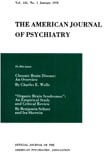Abstract
1. In 1943 at United States primary naval training stations many cadets (perhaps about half) showed symptoms and signs of restlessness, insomnia, fatigue, and apprehension. Questionnaires filled out by 3,181 cadets at 5 preflight schools in their ninth week of training indicated nervous complaints on the part of most of the cadets.
2. Group methods of instruction were employed with the purpose of reducing nervous irritability and excitement in cadets. In preparation, 5 officers were given a course of instruction in progressive relaxation by Dr. Edmund Jacobson. These officers subsequently instructed other officers, until a total of 100 relaxation officers became available for instruction of cadets. The cadets were taught progressive relaxation in classes numbering up to 300.
3. The course in relaxation for cadets was of 10 weeks duration, consisting of 3 periods per week of ½ hour each. This was an abbreviated course, according to Jacobson's classification, since the total was about 10% of the 150 hours of instruction required in a more thorough course. In addition, the cadets generally did not practice with daily regularity as Jacobson prescribes. Accordingly the following procedures can be regarded as tests of results secured by relaxation methods employed on groups under severe limitations, rather than tests of what could have been accomplished under more satisfactory conditions.
4. Tests at the preflight school at Iowa City on 983 cadets who had received such relaxation training indicated approximately 19% reduction of strains, sprains, fractures, and other minor injuries in the test group as compared with a control group.
5. Tests on these same groups revealed a 38% reduction of days lost from injuries. Since the control group was considerably smaller than the test group, no quantitative accuracy can be attached to these figures but they would seem to indicate that on the whole a noteworthy reduction of injuries and of days lost from injuries was probably accomplished by the relaxation training.
6. In 3 preflight schools data were secured concerning the rest in bed of 140 cadets who had received relaxation training as compared with 190 cadets without training. Marked increase of quietude, recorded in percentages as from 27 to 56, occurred in the number of full body turns, parts of body movements, and of talking or mumbling. The reports suggested a marked diminution in dreaming. Figures for the total group indicated that the cadets who had received such relaxation training went to sleep more quickly on the whole and suffered less from insomnia during the night.

